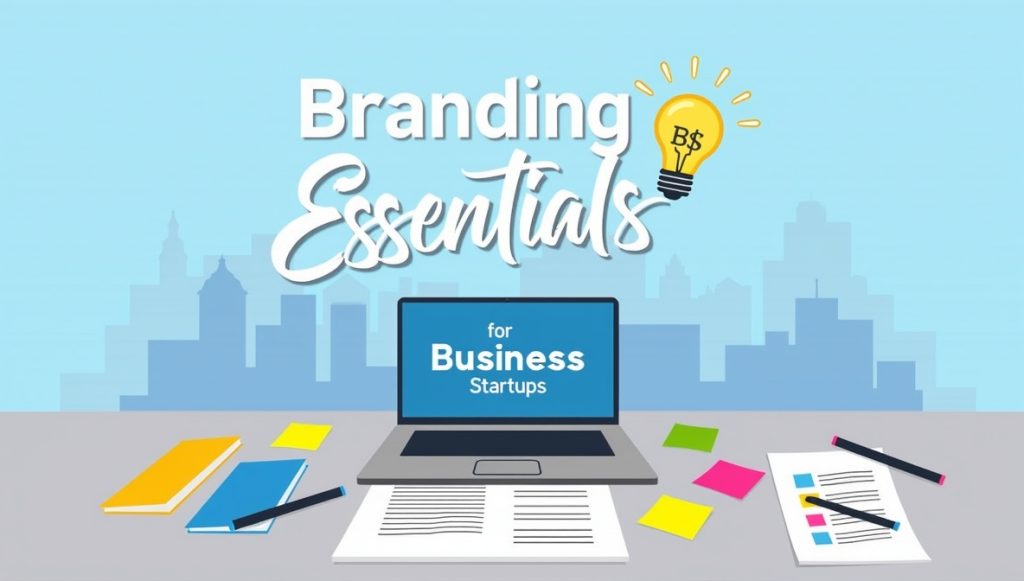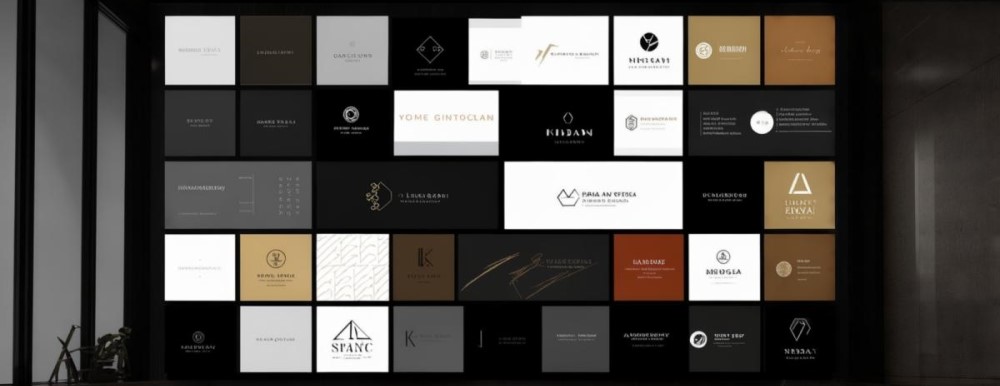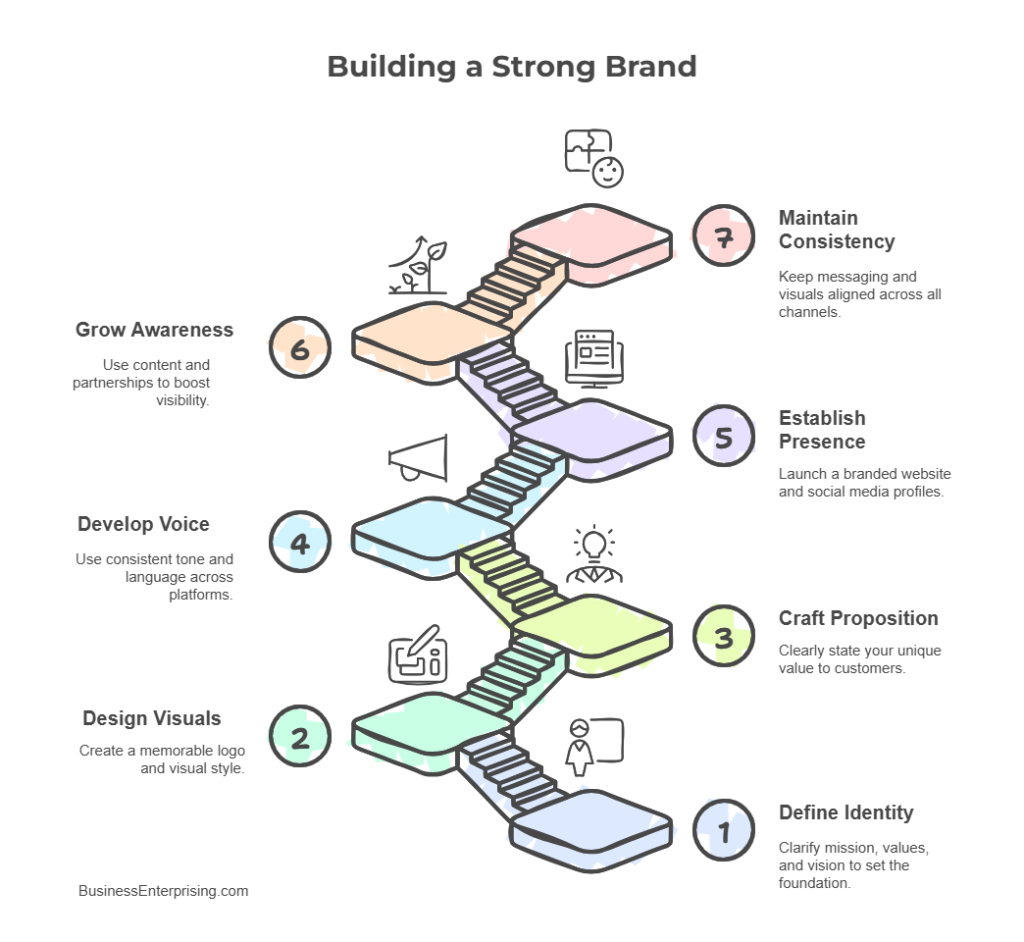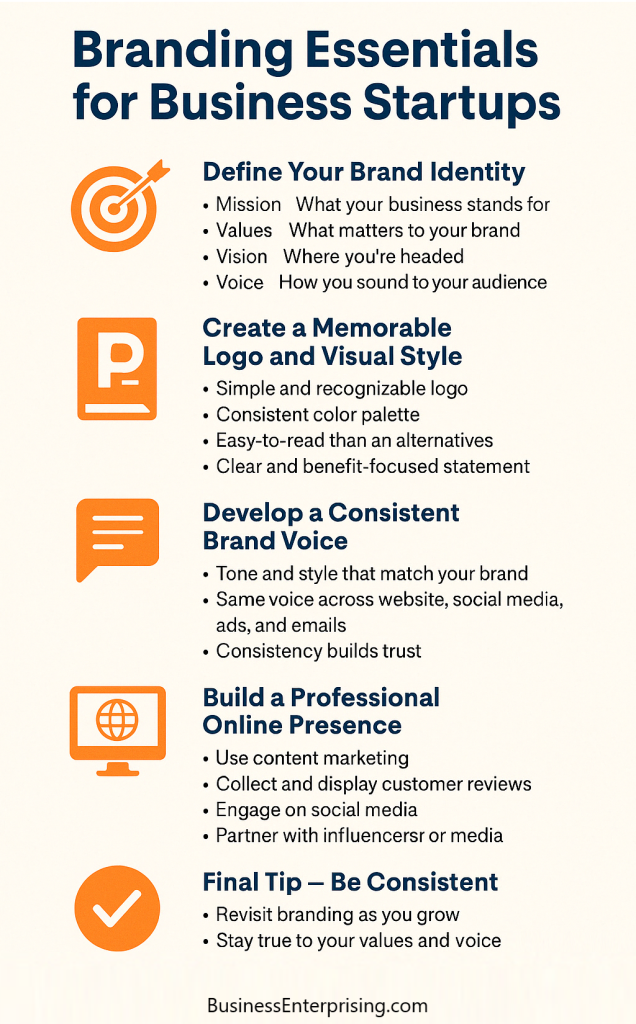
Your brand is more than just your logo. It’s how people see, hear, and remember your business. Therefore, your message, tone, and visuals should work together. When you stay consistent, your brand becomes easier to recognize and trust. That trust can lead to repeat customers.
However, many startups overlook branding until later. This often causes confusion and extra work down the line. Instead, treat branding as a key part of your setup. It helps guide decisions and shapes how your audience experiences your business.
Additionally, branding gives your team something to rally around. A clear mission and voice help everyone stay aligned. This makes marketing easier and keeps your messaging focused. Therefore, it’s worth investing time into each part of your brand.
You don’t need to get everything perfect right away. However, you should aim to be consistent and clear. That’s what creates a brand people remember. With steady effort, you can build something that lasts.
Defining Your Brand Identity
Defining your brand identity is one of the most important branding essentials for business startups. It sets the tone for how people see your business. Before building anything else, get clear on your mission. What do you do, and who do you do it for? Keep your answer simple and specific.
Your values are just as important. They show others what matters most to your business. For example, some brands value transparency, while others focus on innovation. These choices affect everything from product development to customer service. Therefore, it’s worth spending time getting them right.
Next, think about your vision. Your vision is what you hope to become in the future. This should inspire both your team and your customers. Additionally, it helps you make long-term decisions that fit your goals.
Equally important is your brand voice. Your voice is how your brand sounds in writing and conversation. Is it casual or formal? Friendly or serious? Keep it consistent across your website, social media, and emails. That consistency builds trust.
However, your brand identity should not feel forced. It should come from what your business naturally represents. People notice when things feel fake. So be honest and clear. Additionally, review your identity as your business grows. What worked in the beginning may not always apply later.
When you define these elements early, you give your brand structure. More importantly, you create a strong base to grow from. Although many businesses rush past this step, it’s worth doing carefully. With a well-defined identity, your startup can stand out for the right reasons.
Creating a Memorable Logo and Visual Elements
Creating a memorable logo and consistent visuals helps your brand become recognizable. These elements make a lasting impression on your audience. Therefore, choose visuals that reflect your business personality from the start. Don’t overcomplicate your design, but don’t rush it either.
Your logo is often the first thing people notice. It should be simple, flexible, and easy to remember. Additionally, it needs to look good in both small and large formats. Think about how it appears on websites, packaging, and social media.
Color plays a strong role in how people feel about your brand. Certain colors can create trust, energy, or calmness. Therefore, choose a palette that matches your brand’s personality. Use those same colors across your website, logo, and marketing materials. That helps build consistency and recognition.
Fonts matter more than most people think. A modern font gives a different feel than a traditional one. However, you should choose fonts that are easy to read. Keep them consistent across all your brand materials. Additionally, try not to use too many different styles at once.
Cohesive design helps your audience connect with your brand. Every visual should work together to tell the same story. Therefore, build a simple style guide for your brand. That way, you or your team can stay consistent across platforms.
Visual branding isn’t just about making things look nice. It’s part of how people trust and remember you. Among the top branding essentials for business startups, strong visuals carry long-term value. Put thought into your design choices now to avoid rebranding later.
Crafting a Unique Value Proposition (UVP)
Crafting a unique value proposition helps your business stand out. It tells people why they should choose you over someone else. A clear UVP explains what you offer, who it’s for, and why it matters. Therefore, it should be specific and easy to understand.
Many startups struggle to explain their value. However, your UVP isn’t just a slogan. It’s a direct message about the benefits you bring. It also helps guide your marketing efforts by focusing on what matters most to your customers. Additionally, it keeps your messaging consistent across channels.
Your value proposition should reflect your strengths. Ask yourself what makes your business different. Then, describe that in simple terms. Avoid using vague or general statements. Instead, be clear about the results your product or service delivers.
Additionally, think about your target audience. What problem are you solving for them? How are you solving it better than others? When you answer these questions clearly, people notice. Therefore, your UVP should appear on your website, in ads, and in your elevator pitch.
A strong UVP builds trust early. Customers want to know what to expect. However, they also want to know why they should care. When your UVP speaks directly to their needs, it becomes a powerful tool.
Among the branding essentials for business startups, a solid value proposition sets the tone. It helps define your position in the market and gives you an edge. Put the effort into crafting it right. It’s one of the first steps toward long-term brand success.
Developing a Consistent Brand Voice
Developing a consistent brand voice helps people feel like they know your business. It builds familiarity and trust over time. Your voice should match your brand’s personality and remain steady across every platform. Therefore, think carefully about how you want to sound.
Your tone and language matter. Some brands sound casual and friendly. Others choose a more formal or technical approach. However, the key is consistency. Use the same tone on your website, social media, and email campaigns. This makes your brand feel reliable and clear.
Additionally, your brand voice should match how you speak to customers. If your ads are fun but your emails sound cold, people get confused. Therefore, align your messaging style with every interaction—ads, support chats, and replies. This shows people you pay attention.
Avoid switching styles just to follow trends. Customers notice when a message feels off-brand. Instead, build a simple style guide. It helps your team stay aligned on voice, tone, and common phrases. This saves time and keeps your content consistent.
Also, revisit your brand voice as your business grows. It’s okay to evolve it gradually. However, always return to what makes your voice authentic. People connect more easily with brands that sound familiar and clear.
Brand voice is often overlooked but plays a key role in trust-building. Among the branding essentials for business startups, it helps shape every customer interaction. The more consistent you are, the stronger your brand becomes.
Establishing a Professional Online Presence
Establishing a professional online presence is one of the most important steps when launching your business. People will likely find you online first. Therefore, your website and digital content must make a solid impression from the start.
Start by securing a domain name that matches your business. It should be short, easy to spell, and clearly tied to your brand. Additionally, use that same name across all your social media profiles. This keeps things consistent and easy to find.
Your website should be simple, clean, and easy to use. Avoid clutter and focus on clear messaging. However, don’t forget to include key pages like your About, Services, and Contact. These help people understand what you offer and how to reach you.
Additionally, your brand visuals need to match across all digital platforms. Use the same logo, colors, and fonts everywhere. This builds familiarity and helps your brand look more established. Therefore, update all your accounts to reflect your brand identity.
Your content tone should also stay consistent. Blog posts, social captions, and email newsletters should all sound like your brand voice. However, each platform can adapt slightly to fit its format while keeping the message aligned.
Don’t leave your profiles half-finished. Fill out bios, add contact info, and post regularly. A full and active presence builds trust. Among the top branding essentials for business startups, a professional digital presence sets the tone. It tells customers you’re ready for business.
Building Brand Awareness and Credibility
Building brand awareness and credibility helps your startup grow faster. People are more likely to buy from brands they trust. Therefore, it’s important to show your audience that you’re reliable, consistent, and professional.
Start by creating helpful, relevant content. Blog posts, videos, and guides can answer questions your audience already has. Additionally, this content improves your visibility in search engines. Over time, good content builds trust and attracts new customers.
Social proof is another powerful tool. Ask happy customers to share reviews or testimonials. However, don’t fake it—real stories matter more than perfect ones. People want to see how your business helped someone like them.
Additionally, public relations can give your brand extra visibility. Reach out to local media or industry blogs with updates or announcements. A well-placed article or interview builds authority and attracts attention.
Working with influencers can also boost credibility. Look for people who share your values and already engage with your target audience. Therefore, choose partners carefully. Authentic relationships lead to better results and more trust.
Community engagement adds a personal touch. Respond to comments, join local events, or support causes that matter to your audience. Additionally, showing up consistently helps you become more than just a brand.
Among the top branding essentials for business startups, building credibility takes time. However, each effort builds on the last. Focus on being clear, honest, and present. That’s how small businesses become trusted names.
Conclusion
Getting your branding right early helps your business grow with fewer setbacks. It also helps customers remember and trust you faster. Therefore, take the time to build each part of your brand carefully.
You don’t need to be perfect, but you do need to be consistent. Your voice, visuals, and message should work together. Additionally, each element should reflect what your business stands for. That kind of clarity builds lasting relationships with your audience.
However, branding is not something you do once and forget. Your brand will evolve as your business grows. Therefore, review it often and make small changes when needed. Staying consistent does not mean staying stuck.
Additionally, don’t copy what others are doing just to fit in. Your brand should sound and look like you. That’s how you attract the right customers and set yourself apart. Over time, people will come to expect a certain style from your business.
Among the top branding essentials for business startups, the most valuable is trust. Every brand decision you make either builds it or breaks it. Therefore, think about how each detail affects how people see your business.
Branding takes work, but the results last. With steady effort and clear direction, your brand can grow into something strong and recognizable. Keep showing up, keep refining, and stay consistent. That’s how strong brands are built.



